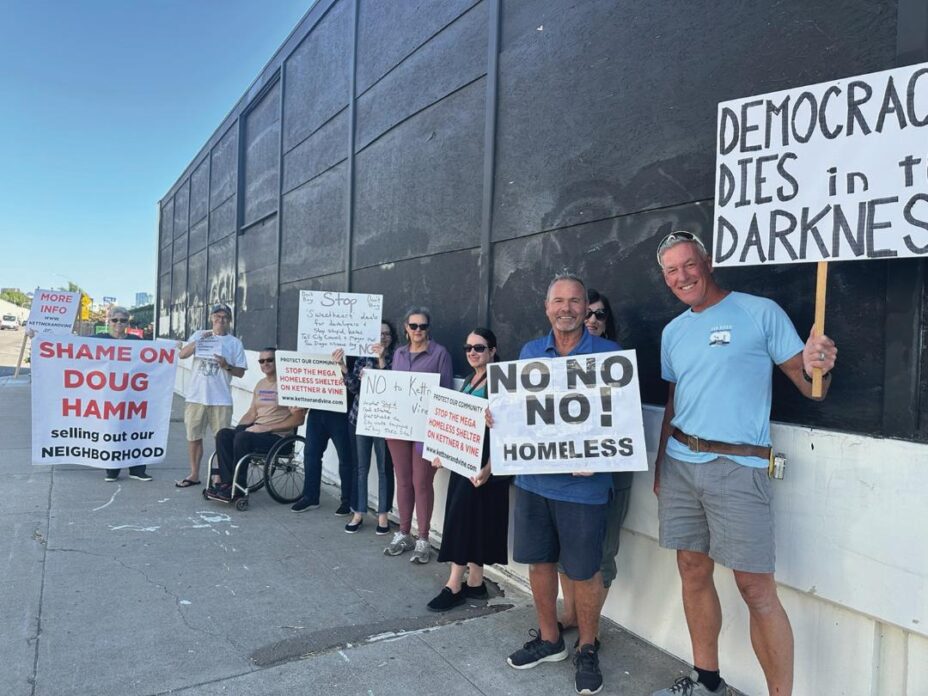Update on Proposed Kettner and Vine Mega Shelter for the Homeless
By Paul Krueger / Previously published in the OB Rag
The future of Mayor Todd Gloria’s proposed 1,000 homeless shelter won’t be known until the City Council returns from its summer break and resumes meeting in September.
But there are rumblings at City Hall that the mayor has — or will — abandon his controversial “mega-shelter,” proposed for an industrial-commercial block at Kettner and Vine Streets, east of the airport in San Diego’s Middletown neighborhood.
The proposed shelter faced a barrage of criticism from residential neighbors who complain that the city made no effort to listen to or discuss their concerns. But those nearby homeowners, renters, and small business owners on India Street are hardly alone in their opposition.
Advocates for the homeless also strongly criticized the proposal, arguing that the site is much to small to properly care for up to 1,000 homeless residents, and that the money would be much better spent on a series of smaller shelters, or — better yet — for deeply-subsidized rental housing and supportive services affordable to San Diegans with monthly incomes of $1,000 (and much less).
The city’s Independent Budget Analyst and City Attorney Mara Elliot’s office also issued stinging critiques of the Mayor’s proposal, focusing on problems with the language of the proposed lease, the condition of the existing buildings, and the monumental cost of the conversion and long-term operation of a 1,000 bed shelter.
Following last month’s contentious public hearing on the proposal, Council President Sean Elo-Rivera and Council members Henry Foster and Kent Lee sent memos to the mayor, outlining their concerns with the proposed Kettner and Vine lease.
Union-Tribune reporter Jeff McDonald mentioned these memos in his stories, and the memos are public documents that should be easy to obtain from the council offices that sent them.
But it took me multiple emails to get them, which is unacceptable for any San Diego resident and taxpayer who has even a passing interest in issues of significant public concern.
After Elo-Rivera’s office declined to provide me a copy of the memo he co-authored with Councilmember Foster, I asked Foster’s office for a copy. A staffer asked why I wanted the memo and what I planned to do with it, which is, frankly, none of their business.
I politely told that staffer I would file a public records request for the document if they didn’t share it with me. The next day, I got an email from Foster’s office noting that the memo was posted on Elo-Rivera’s website, something either office could have told me a week before… if it had, in fact, been posted earlier.
I had a similar problem with Councilmember Lee’s office. My initial email to his top staffers went unanswered. Four days later, I renewed my request, noting that I would file a Public Records Act request for this “identifiable public record” if they didn’t send it to me.
Lee’s office quickly complied.
His two-page memo to the mayor (see bottom of post) is quite conciliatory, with an opening line that thanks the mayor for “the opportunity to provide my feedback” about what the Mayor’s office inspirationally refers to as his “Hope@Vine Campus.”
Lee then questions the cost of the proposed 3.5 percent “rent escalator” and demands a reduction in the annual rent increases to 3.0 percent.
Lee also notes that the proposed $1.95 per square foot per month lease is 25 percent above market rates, and says the Mayor’s office “must negotiate to significantly lower the proposed cost to fall closer in line with (the) market, especially given the already-high profit margin benefiting the property owner.”
Lee also recommends that the Mayor and his staff respond to the detailed and very significant concerns raised by the City Attorney and the Independent Budget Analyst.
Elo-Rivera and Foster’s three-page memo is more pointed and aggressive. It starts with a pronouncement that the proposed lease “…does not adequately safeguard the legal, operational, and financial interest of the City” and lays out eight areas in need of “crucial” review and revision, including an additional, “thorough analysis and advisory” by the City Attorney’s office, the need for more detail on the cost of tenant improvements, and the public release of “all key documents, including building (condition) assessments.
It will be weeks before we know if this orchestrated push-back from such a diverse group of critics has killed the Mayor’s vision of a “Hope @Vine Campus.” If he does abandon his shelter proposal, he’ll most likely do so quietly, by simply not putting it back on the council docket in September.
Of course, that means Council President Elo-Rivera, Council members Foster and Lee, and the dozens of critics and concerned taxpayers will never get answers to their questions about the proposal.
That’s unfortunate, but hardly surprising to those of us who pay attention to the city’s business.

Category: feature, Government, Homeless, Local News, Volunteers







